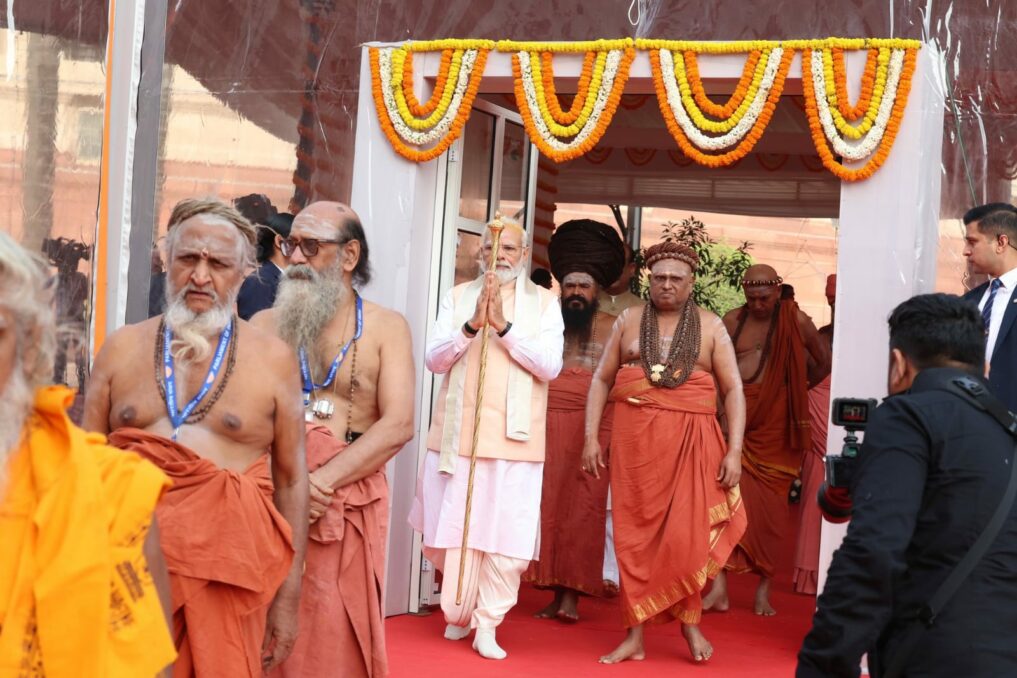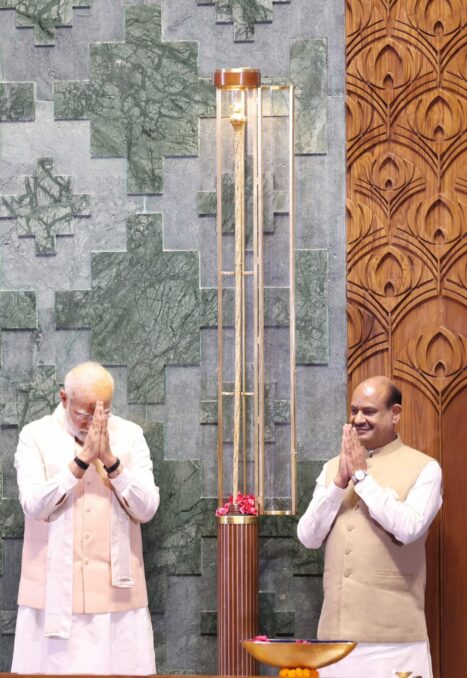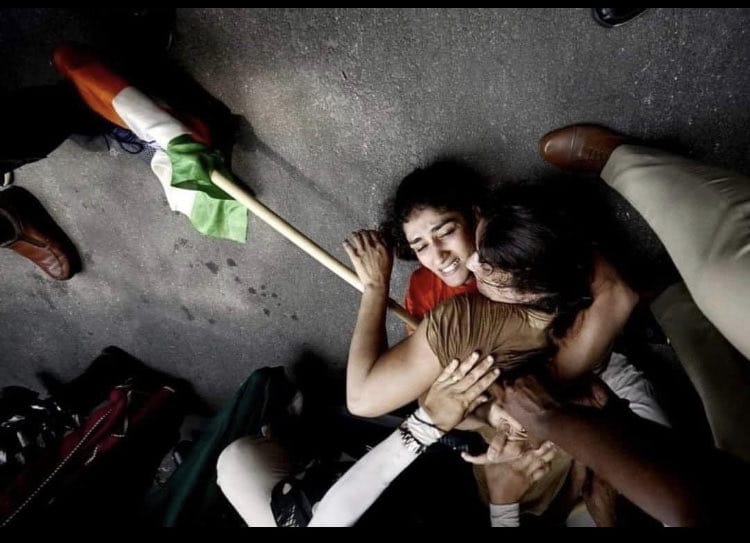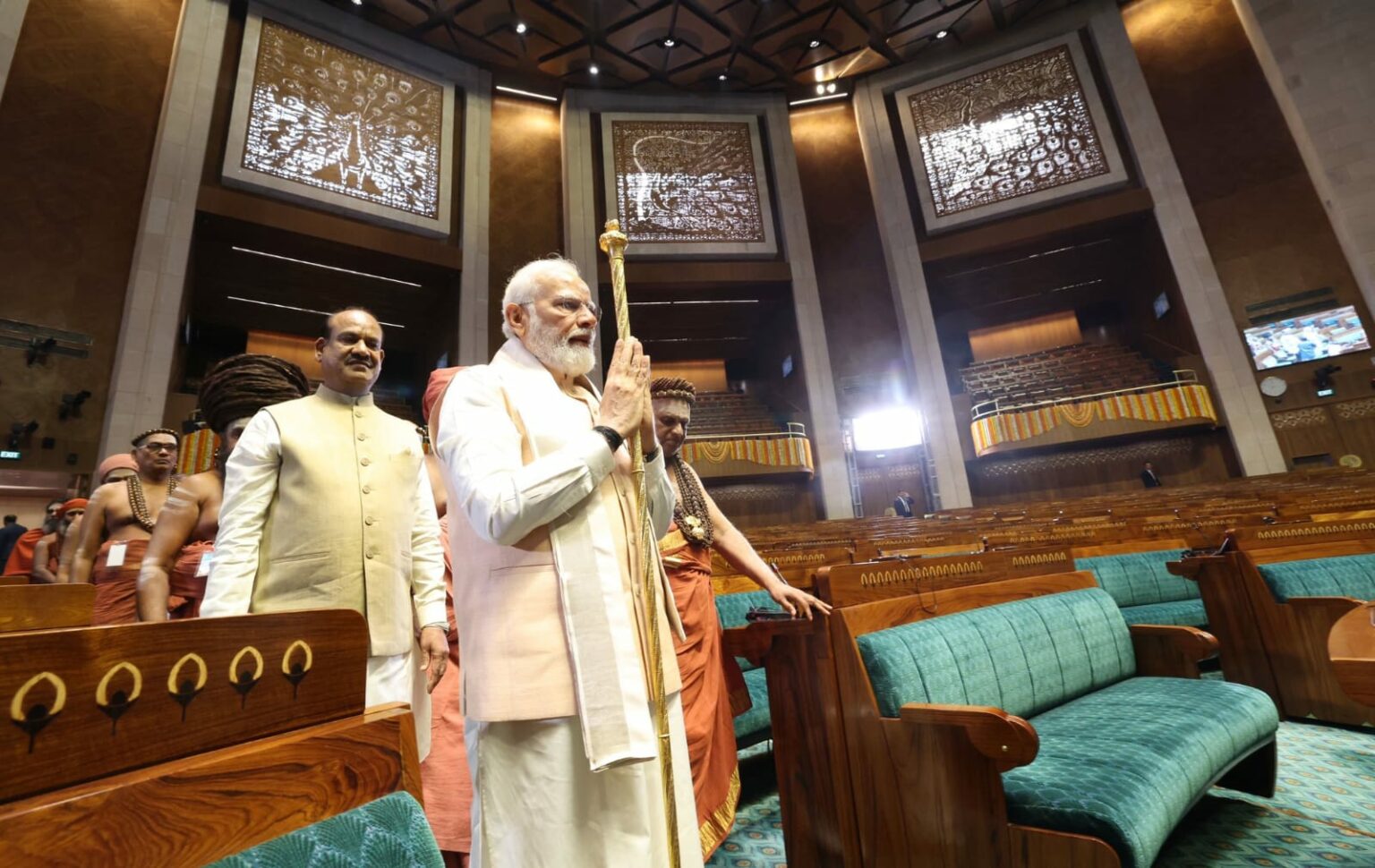New Delhi: In a momentous event today, Prime Minister Narendra Modi unveiled the new parliament building, marking a significant milestone in India’s democratic journey. The Prime Minister, accompanied by Lok Sabha Speaker Om Birla, arrived at the site at 7:30 am, commencing the day with a puja ceremony. Following the conclusion of the puja, Prime Minister Modi humbly prostrated before the historic sceptre ‘sengol,’ a symbol of power and authority.

Image courtesy: @narendramodi?/Twitter
During the puja, the revered Adheenam seers presented the ‘sengol’ to the Prime Minister, who sought their blessings on this auspicious occasion. Holding the historic sceptre in his hands, Prime Minister Modi proceeded to the Lok Sabha chamber, where he reverently installed it beside the Speaker’s chair, signifying the continuity of democratic traditions.
Expressing his gratitude and appreciation, the Prime Minister felicitated a group of dedicated construction workers who contributed their skills and efforts to bring the brand-new parliament to life. Their unwavering commitment played a crucial role in the successful completion of the project.
Continuing the inclusive spirit, representatives from various religious faiths conducted ‘sarv-dharma’ prayers, emphasizing the unity and harmony that underpins India’s diverse society. The nation’s commitment to secularism was reflected in this collective invocation of blessings.
The original parliament building, which was finished in 1927 and is now 96 years old, was insufficient, necessitating the construction of a new one. With its cutting-edge amenities, the new parliament building can easily fit 888 members in the Lok Sabha chamber and 300 members in the Rajya Sabha chamber. Additionally, the Lok Sabha chamber has a capacity of 1,280 members for a joint session of both chambers.
The construction materials used in the new building were sourced from various parts of the country, showcasing India’s rich cultural heritage. Teak wood from Maharashtra’s Nagpur, red and white sandstone from Sarmathura in Rajasthan, and carpets from Mirzapur in Uttar Pradesh are just a few examples. The meticulous selection of materials ensured that the new parliament building reflected the diversity and ethos of the nation.

Image courtesy: @narendramodi/Twitter
Built by Tata Projects Ltd, the magnificent new Parliament House features a grand constitution hall that serves as a tribute to India’s democratic heritage. Additionally, it houses a well-appointed lounge for MPs, a library, multiple committee rooms, dining areas, and ample parking space, providing a conducive environment for legislative proceedings and parliamentary activities.
The striking triangular-shaped four-story building spans an impressive built-up area of 64,500 square meters. Its architectural design incorporates three main gates – Gyan Dwar, Shakti Dwar, and Karma Dwar – symbolizing knowledge, power, and action, respectively. Furthermore, the new parliament building has separate entrances for VIPs, MPs, and visitors, ensuring smooth access for all stakeholders.
To commemorate this historic occasion, the government has announced the release of a special ₹75 coin, serving as a tangible memento of the unveiling of the new parliament house. This coin represents the collective pride and aspirations of the nation as it embarks on a new chapter in its democratic journey.
Opposition boycotts
The inauguration of the new parliament building by Prime Minister Narendra Modi today was marred by the absence of hundreds of opposition party members. The event faced strong criticism from opposition politicians, environmentalists, and civil society groups, who voiced concerns over its cost, construction during the pandemic, and alleged lack of consultation with lawmakers and the public.
This is not the first time the Congress party has stayed away from such an event, as they had also refrained from attending the foundation stone-laying ceremony of the new parliament in 2020. However, this time, several opposition parties came together to announce a boycott of the inauguration ceremony earlier in the week.
They argued that it should have been the country’s president, who holds a largely ceremonial position, to inaugurate the parliament building, rather than Prime Minister Modi. They viewed the decision as a violation of constitutional principles and parliamentary procedures.
In an open letter addressed to the government, opposition groups labeled Prime Minister Modi’s Bharatiya Janata Party (BJP) government as “authoritarian” and criticized his decision to inaugurate the parliament building, sidelining President Murmu.
The letter described this act as a grave insult and a direct assault on India’s democracy. It said, “We find no value in a new building when the soul of democracy has been sucked out of Parliament.”
The absence of opposition members at the inauguration ceremony served as a visible display of their protest against what they perceived as undemocratic actions by the ruling government. Their decision to boycott the event highlights their concerns regarding the erosion of democratic norms and principles.
The opposition’s criticism primarily revolved around the perceived lack of transparency and inclusivity in the decision-making process regarding the new parliament building. They raised objections to the construction project’s cost, particularly during the ongoing pandemic when the government’s focus should be on addressing urgent public health and socio-economic challenges.
Additionally, allegations were made that the government had failed to consult lawmakers and the wider public, thereby diminishing the legitimacy of the project.
Wrestlers detained
The grand inauguration of India’s new parliament building took an unexpected turn today when a group of prominent wrestlers, including Olympic medallists, attempted to stage a protest before the newly unveiled structure. While the ceremony proceeded inside, the wrestlers were detained by the Delhi Police, who prevented them from carrying out their demonstration.

Image Courtesy: Twitter
The wrestlers, led by Vinesh Phogat, Sakshi Malik, and Bajrang Punia, have been actively protesting in Delhi, demanding the resignation and arrest of Brij Bhushan Singh, the president of the Wrestling Federation of India (WFI). Mr. Singh, an influential lawmaker, and politician associated with the Bharatiya Janata Party (BJP), is facing serious allegations of sexual abuse and harassment from female wrestlers. However, he firmly denies these allegations.
The detained wrestlers had planned to march to the new parliament building, where they intended to stage their protest against Brij Bhushan Sharan Singh and bring attention to their demands. Unfortunately, the Delhi Police intervened and prevented them from reaching their intended destination. Additionally, the makeshift tents set up by the protesting wrestlers at Jantar Mantar, a common site for protests in Delhi, were also removed by the police.
The presence of prominent athletes and Olympic medallists in the wrestling community has brought significant attention to the allegations against the WFI president. The wrestlers have been raising their voices to seek justice and accountability within their sporting federation.
The Delhi Police’s detaining of the protesting wrestlers highlights the tension surrounding the issue. While the inauguration of the new parliament building was meant to be a momentous occasion, the wrestlers’ protest serves as a reminder of the ongoing challenges faced by the sporting community and the demand for accountability in cases of alleged misconduct.












